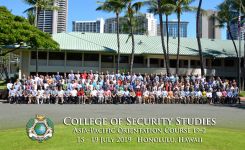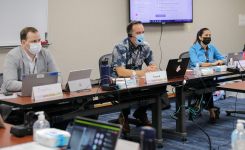- Daniel K. Inouye Asia-Pacific Center for Securi...
- IPOC 22-2 Gives U.S. Security Practitioners New...
IPOC 22-2 Gives U.S. Security Practitioners New Perspective
From November 14-18, 166 security practitioners converged in Honolulu, HI, to participate in the Indo-Pacific Orientation Course (IPOC).
The Fellows, primarily U.S. security practitioners, represented a diversity of departments within the U.S. government. The class included, amongst others, U.S. representatives from the Indo-Pacific Command, U.S. Pacific Fleet, Pacific Air Force, the Department of State, and the United States Agency for International Development (USAID).
Throughout the week, lectures from Center faculty shed light on the factors contributing to the Indo-Pacific’s dynamic security environment. The Fellows received a comprehensive overview of the Indo-Pacific’s sub-regions. The lectures also covered good governance, cooperation, rules-based order, and the various security spheres (traditional military security, economic security, cyber security, maritime security, and climate security).
William Slater, Senior Development Advisor to U.S. INDOPACOM, participated in the course after working in the region for over 25 years. For Slater, IPOC provided an opportunity to engage with peers across all sectors and gain a new perspective on critical issues.
“I think that’s the benefit of this course,” said Slater. “The cross-pollination of expertise [allows you] to think about a new perspective. It is going to enhance our work moving forward.”
A lecture on the first day of the course detailed the ongoing Great Power Competition between the U.S. and China. The topic proved relevant to the Fellow’s seminar sessions throughout the week. The seminar sessions, led by DKI APCSS professors, followed each plenary lecture. In the seminars, the Fellows drew from the diverse expertise in the room, spurring each other to think critically. As the week progressed, Fellows deconstructed and analyzed the U.S. Indo-Pacific strategy. They discussed issues like climate change and cybersecurity and brainstormed avenues to achieve strategic goals.
Further solidifying their learning, the Fellows participated in a formal debate on the effectiveness of the U.S. Indo-Pacific strategy. During the exercise, the Fellows advocated the strengths and weaknesses of the U.S. approach to security.
Among the 166 Fellows, 23 were security practitioners from outside the U.S. The international Fellows came from Australia, Canada, France, Germany, Indonesia, Japan, Nepal, New Zealand, the Philippines, Korea, Singapore, Sri Lanka, Taiwan, the United Kingdom, and Vanuatu. Mi So Kim, Administrative Assistant, Joint U.S. ROK Military Affairs Group, eagerly participated in the opportunity to hear people’s viewpoints from the United States.
Said Kim, “I was surprised that people from the U.S. can have different perspectives and disagree, but we were still able to debate and talk about these issues fairly.”
For Capt. Jeff Dargavel, Director of Strategic Plans, Canadian Armed Forces, the experience in IPOC was timely as he prepared for his own country to announce its Indo-Pacific Strategy.
“Given the region’s size, I think we [Canada] need to be focused on where we engage and focus our efforts,” said Dargavel. “That will require collaboration, coordination, and consultation to find those strategic opportunities, so we keep our efforts consistent with our partners and allies.
Of the 12 seminars, two groups contained exclusively online participants. One seminar hosted senior-level participants at the rank of general officers and senior executives and another seminar was comprised solely of new DKI APCSS staff. The DKI APCSS staff participated in IPOC to familiarize themselves with the Center’s mission. Preston Hall, Network Technology Division Chief, DKI APCSS, found the experience “eye-opening.” John Reiss recently began working as an editor for the College of Security Studies and found the coursework intensive.
“It’s essentially working a master’s level education in the short span of one week,” said Reiss.
The Indo-Pacific Orientation Course (IPOC) provides an executive education experience for mid-career to senior-level security practitioners. The program enhances participants’ ability to engage in cooperative security efforts. IPOC offers a unique opportunity for security practitioners with an extraordinary range of professional experience, levels of education, and perspectives to engage intensively on regional security issues. Fellows attend IPOC tuition-free. Fellows or sending organizations are responsible for travel, lodging, per diem, and other incidental costs. Upon completing this course, Fellows receive a Certificate and Alumni Status. In 2023, DKI APCSS will take IPOC internationally and host IPOC from South Korea.



